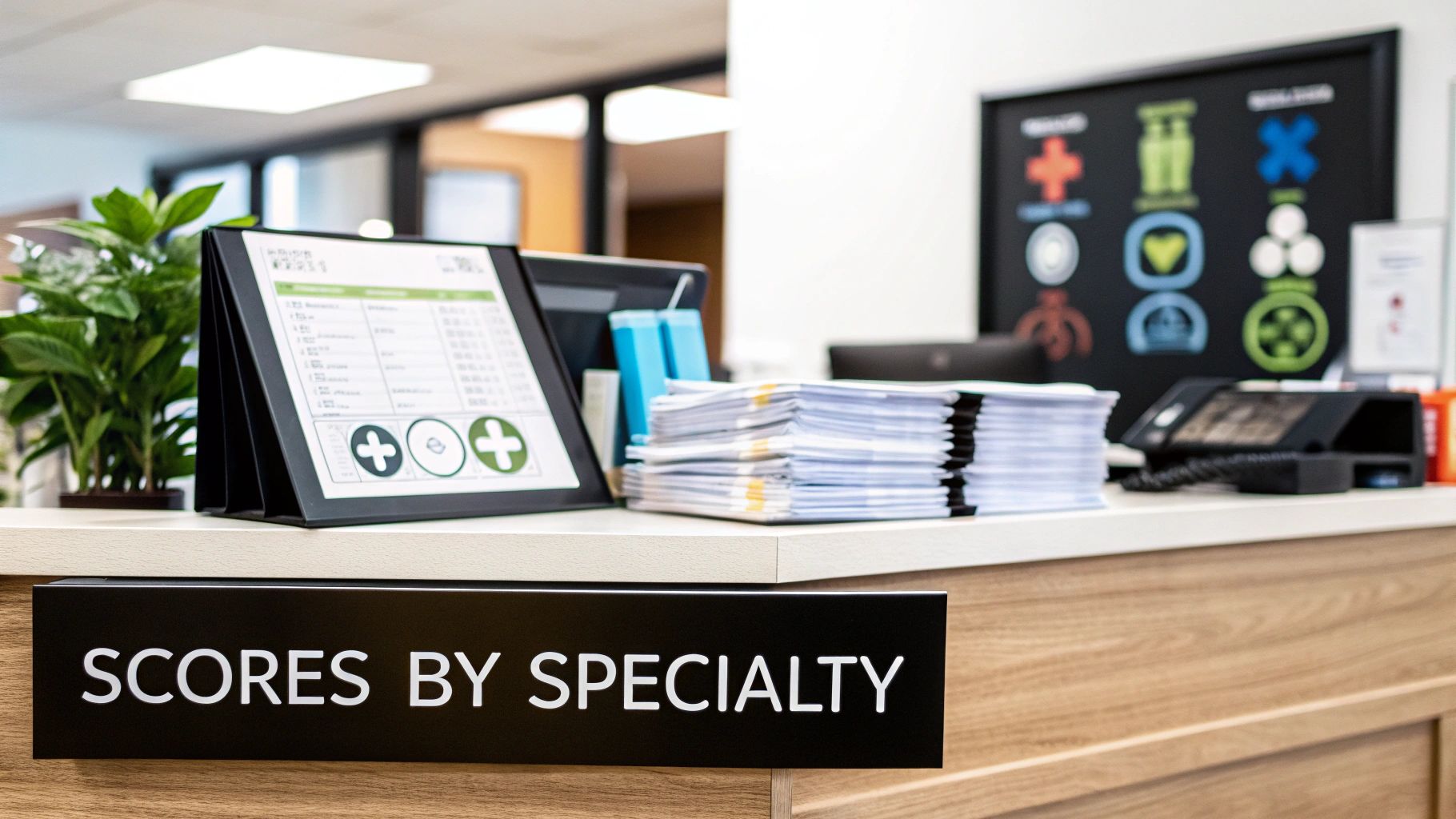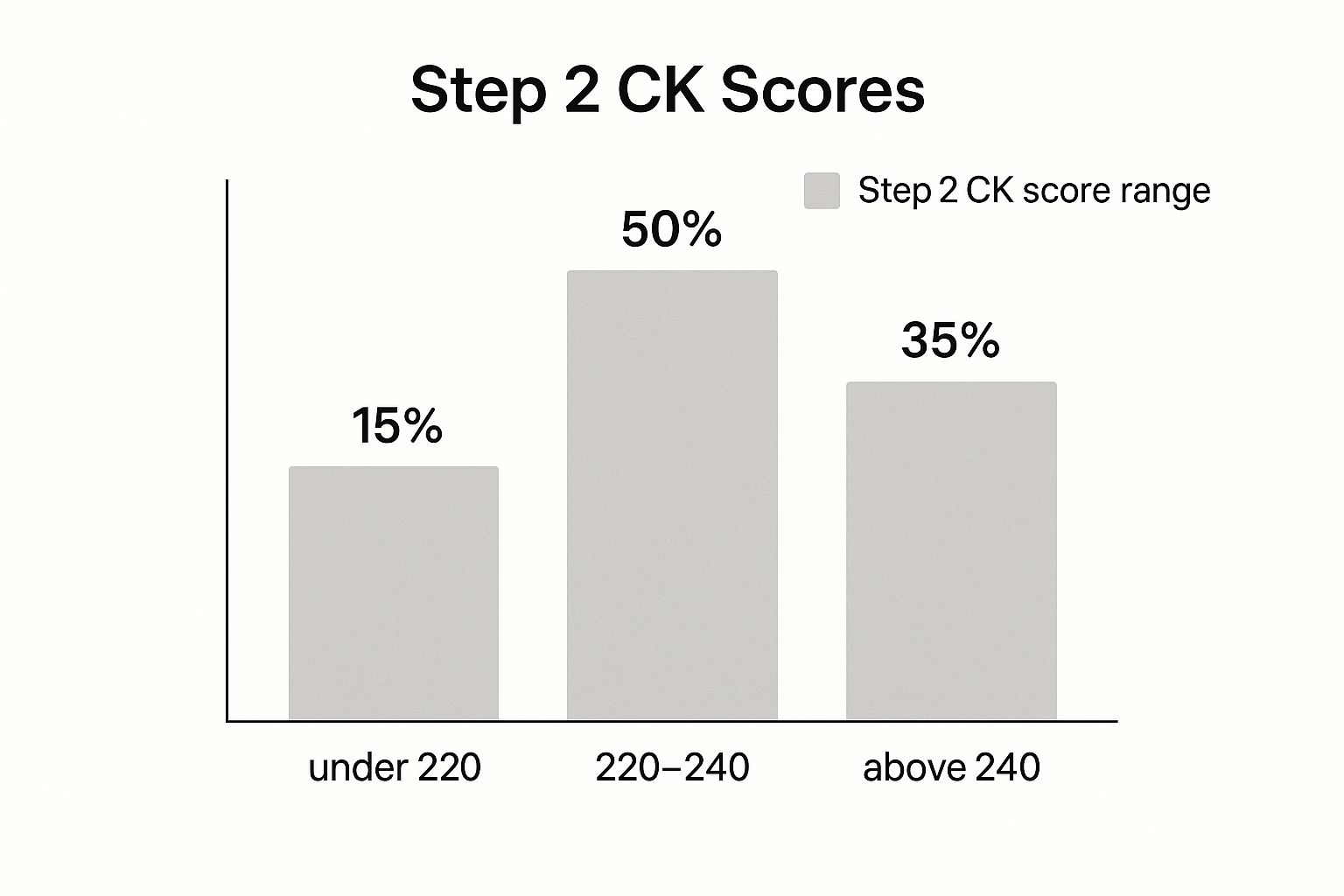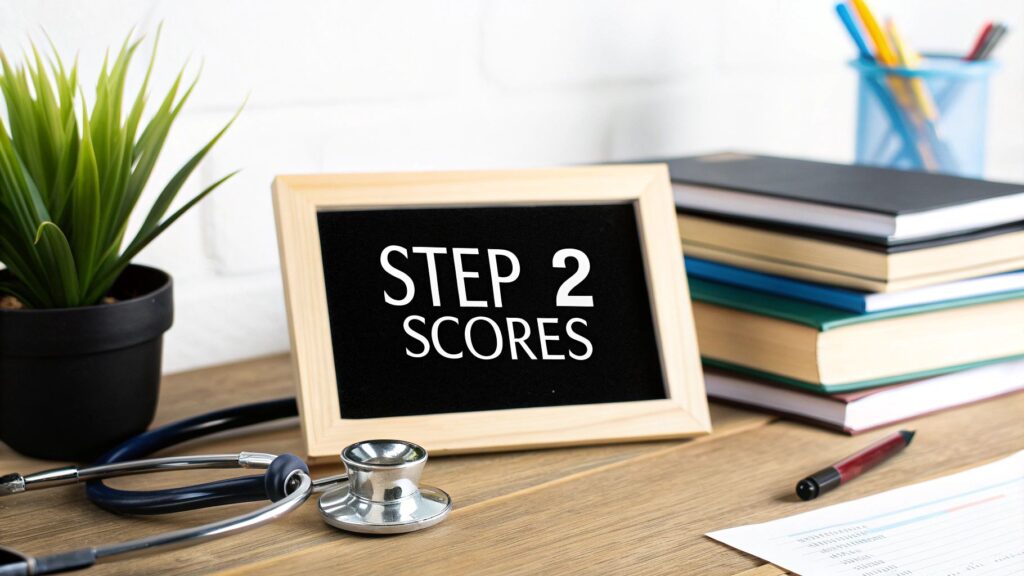The real story behind Step 2 scores by specialty boils down to one word: competitiveness. Highly coveted fields like plastic surgery, dermatology, and otolaryngology consistently demand scores cresting around 257. On the other hand, specialties like family medicine or psychiatry are more attainable, with averages in the low 230s.
Since Step 1 went pass/fail, your Step 2 CK score has become the single most important academic yardstick on your residency application. It's the new benchmark.
Understanding the New Step 2 Landscape

The switch to a pass/fail Step 1 fundamentally rewired the residency application game. For years, a stellar Step 1 score was the ultimate proof of academic horsepower. Now, that entire burden rests squarely on the Step 2 CK score, making it the primary filter for program directors wading through thousands of ERAS applications.
This isn't just about checking a box anymore. Your performance on Step 2 is now seen as a direct reflection of your clinical reasoning and knowledge base. Program directors use this three-digit number to make a rapid judgment call on your readiness for the intense demands of residency.
Key Changes to Consider
So, what does this shift actually mean for you?
- Primary Academic Metric: Forget everything else for a moment. Your Step 2 score is now the main objective measure of academic performance on your application. Period.
- Increased Screening Pressure: With a flood of applications, programs need a quick way to trim the list. A competitive Step 2 score is your ticket past that first digital gatekeeper.
- Demonstrated Clinical Proficiency: A strong score does more than just look good; it signals that you can connect foundational science to real-world patient care—the most critical skill for any intern.
The minimum passing score for Step 2 CK is currently 214. But let's be realistic—successful applicants gunning for competitive programs are often aiming for scores well above 255 to even get a serious look. This score has become the critical currency for proving your clinical competence.
Grasping this new reality is the first step. A strategic approach to your prep isn't just about passing anymore; it's about hitting a score that opens doors to the specialty you've been dreaming of.
If you're just starting to map out your study plan, our guide on how to study for Step 2 CK provides a detailed roadmap to get you ready. The rest of this article will walk you through the hard data you need to set ambitious, yet achievable, goals for yourself.
Why Your Step 2 Score Is A Critical Application Filter

With Step 1 officially pass/fail, your Step 2 CK score has been thrust into the spotlight. It's no longer just another number on your transcript—it's now the primary academic filter for a huge number of residency programs.
Think of it from a program director's perspective. They're drowning in thousands of applications, and they need a quick, standardized way to sort through the pile. Your Step 2 score is that tool. It’s their first, and often most important, data point for gauging your clinical knowledge and reasoning skills.
A high score can get your foot in the door. A score below a program's cutoff, on the other hand, might mean your application never even gets a look from a real person. This three-digit number is a massive differentiator in a sea of qualified applicants.
The Score as a Gatekeeper
Your Step 2 CK score doesn’t just stand alone; it provides crucial context for your entire application. It interacts with your letters of recommendation, your research experience, and your personal statement, either amplifying their strengths or exposing potential weaknesses.
A strong score can:
- Validate a great application: It confirms that your glowing letters and strong clinical grades are the real deal.
- Balance your profile: It can make up for an application that might be a bit light on research or other extracurriculars.
- Open doors to "reach" programs: A high score can earn you an interview at a top-tier program that might have otherwise screened you out.
On the flip side, a score that’s below average for your dream specialty puts immense pressure on everything else. The score acts as the initial gatekeeper; you have to get past it before your full story has a chance to be heard.
Your Step 2 score is a direct signal of your academic discipline and clinical acumen. For program directors, it’s a reliable predictor of your potential to handle the demands of residency and succeed on future board exams.
The High Stakes of Your First Attempt
Let's be clear: passing on your first attempt is non-negotiable. The data from the 2023–2024 testing cycle is sobering. An overwhelming 98% of first-time takers from US and Canadian medical schools passed the exam.
But for those who had to repeat the exam, the pass rate plummeted to just 74%. A first-time failure is a major red flag.
While passing is the bare minimum, a competitive score on that first try is what truly shapes your match prospects. You can dig into the specifics yourself in the official USMLE performance data.
Comparing Step 2 Scores Across Medical Specialties
Let's be honest: your Step 2 CK score is a massive piece of the residency application puzzle. Understanding the average Step 2 scores by specialty isn't about stressing over numbers; it's about creating a data-driven map for your future. The scores tell a story about the competitive landscape, showing you which fields demand near-perfect board scores and which offer a more holistic review.
To make sense of it all, I've broken down specialties into three tiers of competitiveness. This framework will help you contextualize your performance and set a realistic, yet ambitious, target score for your dream specialty.
The Most Competitive Specialties
These are the big leagues. The most sought-after residency positions demand exceptionally high scores, period. These fields are known for having very few spots and a massive pool of highly qualified applicants. A top-tier score isn't just an advantage here—it's often the price of admission to even get your application reviewed.
For specialties like Plastic Surgery, Dermatology, and Otolaryngology (ENT), the average Step 2 CK score for matched applicants is a staggering 257. Similarly, if you're aiming for Orthopedic Surgery or Neurosurgery, you'll want to be in the 252-256 range to feel confident.
A score in the high 250s for these fields doesn't guarantee a match, but it ensures your application gets past the initial screening filters used by most top-tier programs. It signals you have the academic horsepower to handle the rigors of these demanding specialties.
Moderately Competitive Fields
This middle tier covers a wide range of popular and respected specialties. While you still need to bring your A-game, the score expectations are a bit more forgiving than in the top-tier fields. A strong application with a solid, but not necessarily flawless, score can absolutely succeed here.
This group includes:
- General Surgery: Average matched score around 247.
- Emergency Medicine: Average matched score around 246.
- OB/GYN: Average matched score around 245.
- Internal Medicine: Average matched score around 245.
These scores show that while excellence is still the standard, there's more room for a holistic review. Program directors in these fields will often weigh your clinical grades, letters of recommendation, and research experience heavily alongside your Step 2 score.
This infographic gives a great visual breakdown of the general distribution of Step 2 CK scores.

As you can see, the bulk of students score between 220 and 240, which really drives home the point that a score above this range is what makes you stand out from the crowd.
More Accessible Specialties
Finally, some specialties are known for placing a heavy emphasis on an applicant's passion for the field and demonstrated commitment to patient care, rather than just board scores. A solid academic record is always a plus, but these programs often have a lower average Step 2 score for their matched applicants.
Fields like Family Medicine (average score ~241), Psychiatry (~242), and Pediatrics (~245) fall into this category. Here, a score in the low 240s is often competitive, which allows other parts of your application—like powerful personal statements, meaningful volunteer work, and a great interview—to truly shine.
To get an accurate sense of where you stand, you absolutely have to use practice exams. Check out this guide on the best NBME practice exams for Step 2 to benchmark your progress and set an achievable target score. It's the only way to know if you're on track.
Average Step 2 CK Scores by Specialty Competitiveness
To give you a clearer picture, this table breaks down the score data across the different tiers of competition. Use it to see where you need to be.
| Specialty | Competitiveness Level | Average Step 2 CK Score (Matched Applicants) | Score Range for Strong Consideration |
|---|---|---|---|
| Plastic Surgery | High | 257 | 250-265+ |
| Dermatology | High | 257 | 250-265+ |
| Otolaryngology (ENT) | High | 257 | 250-265+ |
| Orthopedic Surgery | High | 252 | 245-260+ |
| Neurosurgery | High | 256 | 248-260+ |
| General Surgery | Medium | 247 | 240-255 |
| Emergency Medicine | Medium | 246 | 238-255 |
| OB/GYN | Medium | 245 | 238-255 |
| Internal Medicine | Medium | 245 | 235-255 |
| Pediatrics | Lower | 245 | 235-250 |
| Psychiatry | Lower | 242 | 230-250 |
| Family Medicine | Lower | 241 | 230-250 |
Remember, these are just averages. A stellar score can help overcome weaknesses elsewhere in your application, while a lower score might need to be balanced by exceptional clinical grades, research, or letters of recommendation. Use this data not as a rigid rule, but as a guide to inform your study strategy and application approach.
Understanding the Rising Score Trends for All Specialties

It’s easy to think of the score rat race as something that only affects people gunning for dermatology or plastic surgery. But here's the reality: the bar is rising for everyone. The upward creep in Step 2 scores by specialty isn’t just a problem for the top-tier fields; it’s a seismic shift happening across the entire residency landscape.
This score inflation means that the historical averages you might find online are becoming obsolete faster than you can say "UWorld." Relying on data from just a few years ago can give you a dangerous false sense of security. The applicant pool is more prepared than ever, and with Step 1 now pass/fail, the collective focus has sharpened intensely on Step 2 CK. That’s driving scores higher across the board.
Why Every Specialty Is Getting More Competitive
The main reason for this trend is the sheer weight program directors now place on the Step 2 CK score. It has become the definitive academic yardstick, forcing applicants in every single specialty to aim higher. No field is immune to this score creep.
You can see this shift clearly even in specialties traditionally considered less score-sensitive. For example, the average score for matched applicants in family medicine has jumped significantly. This really drives home a critical point: strong clinical knowledge, as measured by Step 2, is fast becoming a universal expectation, not a bonus.
The key takeaway here is that historical averages are just a starting point. To truly be competitive, you have to aim above the median score for your desired specialty, because you can bet that the threshold will be higher by the time you apply.
The Data Proves the Upward Trend
This isn't just a gut feeling or anecdotal chatter. Recent data absolutely confirms this score inflation. Over the last few years, Step 2 CK scores have climbed steadily across a huge range of specialties, showing just how much more competitive the applicant pool has become.
Let’s take family medicine as an example. It's a field traditionally associated with lower average Step 2 CK scores. But the average score for a matched applicant went from 238 in 2020 to 244 in 2024. While a 244 is still below the general mean of around 249, that six-point jump is a huge signal that even less score-focused specialties are demanding higher academic performance.
This data is a powerful reminder that aiming for yesterday’s average is a risky, and likely losing, strategy. You can dig into more details on these score trends to help you set a more realistic and future-proof target score.
How to Set Your Strategic Target Score
Looking at the average Step 2 scores by specialty is a great starting point, but it's just a map. To find your destination—your personal target score—you need to take a hard, honest look at your entire application. Think of your Step 2 CK score as a powerful lever. It can either solidify an already stellar profile or help compensate for areas that program directors might see as weaker.
Your application is a balancing act. On one side, you have your Step 2 score. On the other, you have everything else: clinical grades, letters of recommendation (LoRs), research, and your personal statement. The goal is to make sure the scale tips decisively in your favor.
Assess Your Entire Profile
Before you even think about a specific number, you need to do a candid self-assessment. Where do you stand right now?
- Clinical Grades: Are your Shelf exam scores and clerkship evaluations consistently strong, or are they a mixed bag?
- Letters of Recommendation: Have you built strong relationships with faculty who can write glowing, specialty-specific letters for you?
- Research and Extracurriculars: Do you have meaningful research, publications, or volunteer work that lines up with the specialty you’re aiming for?
Answering these questions honestly tells you what job your Step 2 score needs to do. When you start building your study plan, remember that success starts with a clear target. For a deeper dive into this, you might find these effective goal-setting strategies helpful for framing your approach.
Use Cases: How to Set Your Score
Your target score shouldn't be a static number pulled from a chart. It needs to be dynamic, adjusted based on your specific profile and the competitiveness of your chosen specialty.
Scenario 1: The Amplifier
Imagine an applicant with a strong research portfolio, amazing LoRs, and high honors across all core clerkships. For this person, a high Step 2 score acts as an amplifier. Aiming for a score at or just above the average for a competitive field like Orthopedic Surgery (~256) confirms their academic excellence. It makes them a ‘must-interview’ candidate.
Scenario 2: The Compensator
Now, consider a student passionate about Emergency Medicine but who has limited research and just-average clinical grades. This applicant needs their Step 2 score to do some serious heavy lifting. Aiming for a score of 255+, well above the EM average of ~246, would showcase exceptional clinical knowledge and force program directors to take a second look at their application.
A strategically high Step 2 score can effectively neutralize perceived weaknesses in other areas of your application, reopening doors to programs that might have otherwise screened you out based on other metrics.
Building Your Primary and Parallel Plans
Finally, a smart target score keeps you competitive for both your dream specialty and a realistic backup plan. If you’re all-in on Dermatology, your target should be 260+. But that same score also makes you an incredibly compelling candidate for less competitive fields if you decide you need to pivot.
A detailed plan is your greatest asset here. For help structuring your prep time, our detailed Step 2 CK study schedule offers a solid framework for building a timeline that actually works for you. By setting a strategic target, you’re not just studying for a test; you’re crafting the most compelling story possible for your residency application.
Frequently Asked Questions About Step 2 Scores
Figuring out the residency match can feel like trying to solve a puzzle with half the pieces missing, especially when it comes to test scores. Even after you've looked at the data on Step 2 scores by specialty, you're probably left with a handful of very specific, high-stakes questions.
This section tackles those common concerns head-on. We'll give you the straight answers you need to move forward with a clearer strategy and a lot more confidence.
How Do Program Directors View Multiple Step 2 CK Attempts?
Let's be direct: program directors overwhelmingly prefer a first-time pass on Step 2 CK. A failed attempt, even if you come back and crush it with a high score, plants a seed of doubt. It can make them question your foundational clinical knowledge or how you handle high-pressure situations.
For the most competitive specialties, a failure is often a dealbreaker—it's one of the easiest ways for programs to filter out a large chunk of applications automatically. In less competitive fields, you might be able to recover with a fantastic explanation and a truly stellar application, but you'll be fighting an uphill battle from the start.
Your first attempt carries enormous weight. If you have to repeat the exam, you're starting from a defensive position and the rest of your application needs to be practically flawless to make up for it.
Is There a Score That Guarantees an Interview?
No. Not a single one. Even a jaw-dropping 270 can't guarantee you an interview slot. While an exceptional score will almost certainly get your application through the initial computerized screening filters, residency selection is far from a numbers-only game.
Program directors are looking at the whole picture of who you are. They're weighing everything:
- Glowing letters of recommendation from mentors they trust.
- Your clinical grades and the narrative of your MSPE.
- Meaningful research or volunteer work that shows your passion.
- A personal statement that feels authentic and tells a compelling story.
Think of it this way: a top-tier score gets your foot in the door and makes the program director lean in for a closer look. But the rest of your application has to be strong enough to walk you through that door and land the interview.
Should I Delay Graduation to Get a Higher Score?
This is a massive decision with serious consequences, and it absolutely should not be taken lightly. Pushing back your graduation to chase a higher score might sound tempting if your practice tests are falling well short of your specialty's average, but it comes at a cost: an unexplained gap in your medical training.
This is a path usually reserved for extreme situations, like when a student is at serious risk of failing the exam. You have to carefully weigh the financial, personal, and professional fallout of delaying. Before you even consider it, you must have a long, in-depth conversation with a trusted faculty advisor or mentor.
How Important Is the Step 2 Score for an IMG?
For International Medical Graduates (IMGs), the Step 2 CK score is critically important—arguably even more so than for US-based graduates. Program directors are looking at applicants from countless medical schools around the globe, and USMLE scores are their most reliable tool for making standardized, apples-to-apples comparisons.
A high Step 2 score is one of the most powerful assets an IMG has. It's a direct way to prove your clinical knowledge is on par with, or better than, your US peers, helping to overcome any potential biases. In fact, many programs hold IMGs to a higher standard, with unofficial score cutoffs that are loftier than those for US applicants. For IMGs, aiming for a score well above the average isn't just a goal—it's a vital strategic move.
At Ace Med Boards, we know that hitting your target score is about more than just memorizing facts; it’s about having the right strategy and a solid support system. Our expert tutors provide personalized, one-on-one guidance to help you master high-yield topics and walk into your exam with confidence. Start with a free consultation today and let's build a plan that gets you the score you need.

